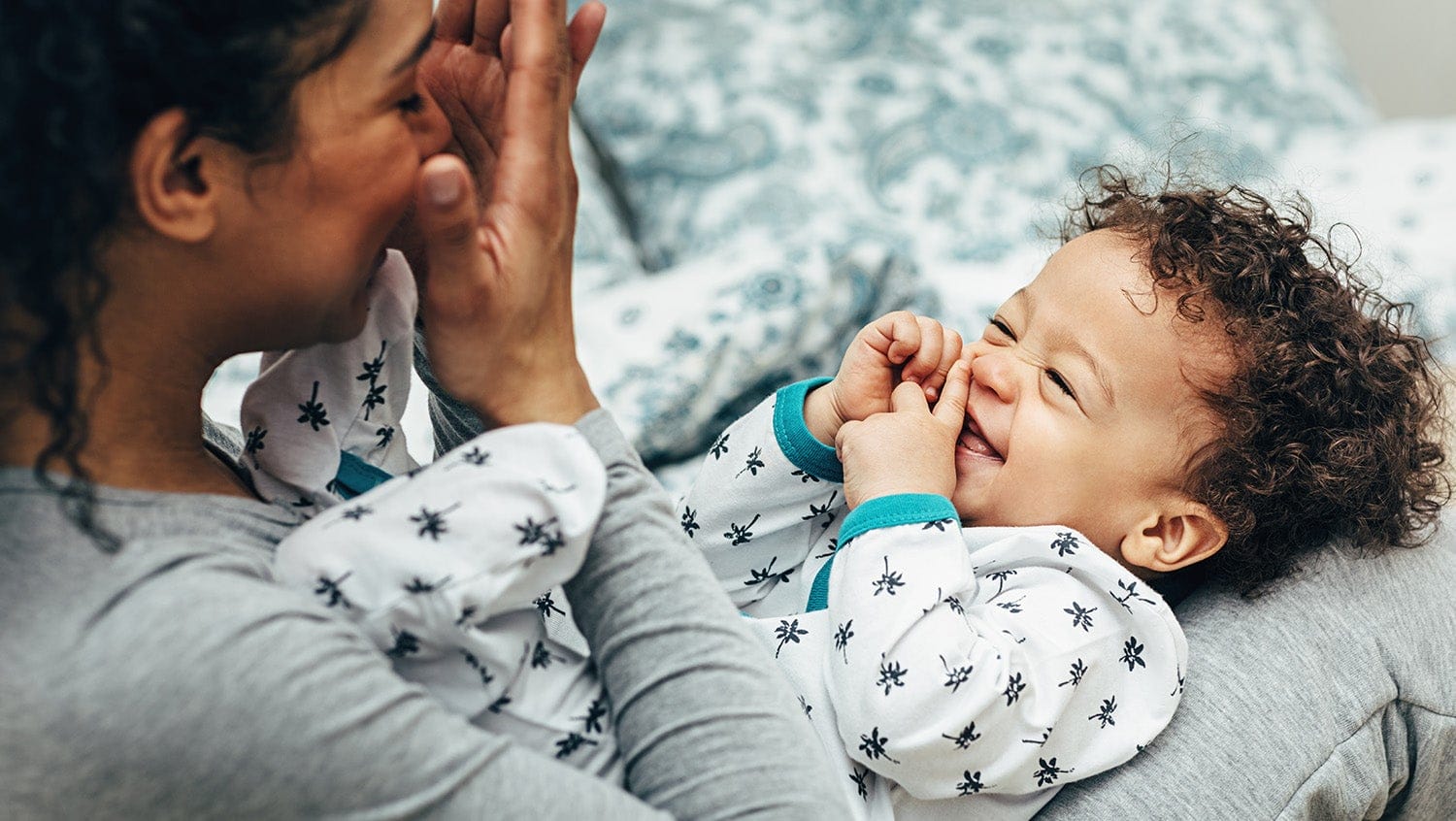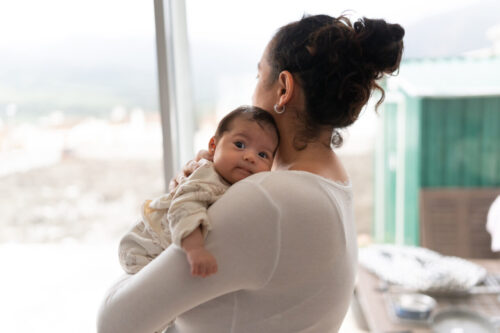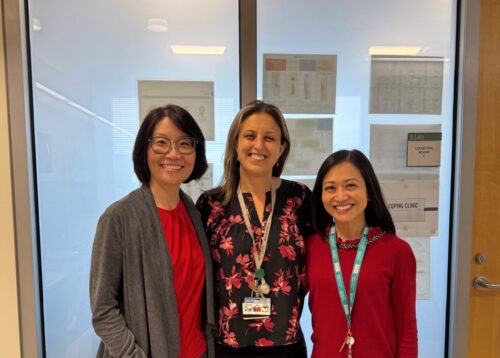Can Parenting Interventions Help Mothers with OUD and Their Babies?
July 7, 2021

Getty Images
A new clinical trial will research how BRIGHT, a trauma-responsive, attachment-based therapeutic parenting intervention, helps mothers with addiction and their children.
It’s 3 a.m. A newborn is fussing and crying, unable to communicate what they need. It’s a stressful time for any parent. But for a new mother who lives with opioid use disorder and is in treatment, it can cue overwhelming feelings associated with trauma and can trigger a desire to use substances. Add to it that newborns who have neonatal opioid withdrawal syndrome can have a higher propensity to being fussy, it’s clear that the mother needs help for both their wellbeing and their child’s.
Yet, stigmatization, fear of having their children taken away by the Department of Children & Families, shame and guilt, and concerns about judgment from pediatricians and other providers have hindered many new moms with substance use disorder (SUD) from seeking that help.
“It’s just very hard when you’re judged, like I’ve seen specials…on TV where babies are detoxing and the mothers are being interviewed… people automatically judge those women, like they don’t love their children, and … they’d rather be using, and that’s typically not the case,” says one mother with opioid use disorder (OUD) who responded to a 2020 research study about disclosure of SUD among women who are or were pregnant. “It’s so hard for a woman … that struggles with addiction and yet still wants their baby to be healthy and to thrive.”
Another woman who responded to the same study echoed a similar sentiment: “I always felt like if I was to tell a doctor…that I’d be so judged and looked at like a piece of crap for having a newborn and having a drug addiction.” However, she added in a potential path forward: “You need somebody there that…understands.”
Reinforcing opioid addiction recovery with parenting help
Ruth Paris, PhD, LICSW, is a licensed independent clinical social worker and an associate professor at Boston University School of Social Work who works with the Grayken Center for Addiction at Boston Medical Center (BMC) and the lead author of the study about disclosure of SUD among pregnant women. Paris is also the principal investigator of the Growing Together Study, a randomized controlled trial of BRIGHT (Building Resilience through Intervention), a trauma-responsive and attachment-based therapeutic parenting intervention for pregnant women and mothers with SUD and/or OUD and their children, birth through age 5.
“We understand that the co-occurrence of a substance use disorder, predominantly opioid use disorder, with mental health disorders and trauma, history of both childhood and adult trauma, is challenging to say the least, and it absolutely impacts any part of a woman’s life, including her parenting,” says Paris.
BRIGHT aims to foster the parent-child relationship by increasing a mother’s parenting capacities and maternal sensitivity. It bets on the theory that boosting this engagement between a mother and child is going to overall help both the parent and the baby, who are highly represented in the population of children who are removed from homes due to abuse or neglect.
“We’ve seen from our data that moms who feel better about their parenting are more likely to stay in recovery,” explains Paris. “So [BRIGHT] is not a substance use treatment program per se. We work in conjunction with substance use treatment, but we are reinforcing of recovery.”
What the BRIGHT parenting intervention looks like
The new mother with SUD responded to Paris’ study saying that what she and other parents like her really needed was someone who understood, someone who wouldn’t shame or stigmatize. With BRIGHT, once a baby is born, a clinician is with the mother in the hospital, visiting. And when the mom goes home or to a residential treatment program, the clinician continues to work with the mother and the baby as a dyad.
A lot of the parenting intervention promotes pleasure and play with the mother and child. With a 2-year-old, Paris says, it might be playing together on the floor with toys or blocks and having the mom notice how her child attunes to her. With a 1-month-old, a place to start is to have a mother recognize the baby’s smile. It’s having the clinician ask questions like, “Look at your baby look at you. What do you think they’re thinking about in this moment.” And it’s not just during playtimes. In those 3 a.m. crying, stressful times, a mother is guided to ask, “What is happening with the baby? What do you think the baby’s feeling?”
For moms who have a long history of addiction, brain science has shown that they have a harder time registering the emotions of an infant in the same way as a mother without SUD can.
“This is another human being who has ideas and thoughts and feelings. And they’re obviously in a very nascent state at 1, 2, and 3 months, but [the intervention] is about beginning to think, ‘who is this child? What do they need? And what’s the best way to provide that for them?'” Paris explains.
While primarily, the parenting intervention is about the attunement and engagement of the parents to their children, BRIGHT also helps with maternal emotion regulation, which can be a concern both in trauma and with substance use disorders.
“What we do know from research now is that many of these moms’ parenting abilities can be compromised, both because of the long-term effects of substance use on the brain and the whole dopamine system,” Paris says. “We are working to retrain the brain to be able to have moms experience the pleasure of parenting an infant or young child.”
With the mom alone, BRIGHT also focuses on reflecting on what her parenting experience was, how she was parented, and how she might want to do it differently. Or, in the case of the parents who are not first-time moms, who have lost custody of children before, they reflect on how this time can be different in treatment. Paris notes specifically how much of BRIGHT is about building women’s confidence as mothers.
“There is no perfect parenting and none of us are perfect parents, but it’s about being able to help a mom find what feels right to her and be able to reflect on it with a therapist,” she emphasizes.
A new clinical study about parenting interventions for women with opioid addiction
Paris and her team have been working collaboratively with the Institute for Health and Recovery for more than a decade to deliver early childhood intervention for mostly mothers, but some fathers, with SUD, predominantly OUD, and they have been funded by SAMSHA. In the past, BRIGHT has been implemented in substance use treatment programs, including residential treatment programs and methadone clinics. However, in 2018, Paris was funded by HRSA to do a clinical trial of the intervention in a perinatal setting at BMC.
Paris just recently closed recruitment of that trial from Project RESPECT, a high-risk obstetrical and addiction recovery medical home at BMC, run by Kelley Saia, MD. Paris recruited women at 24 weeks of pregnancy and will continue until six months postpartum, with a follow-up at nine months. At the time, many of the women will also be seen at SOFAR, BMC’s multidisciplinary program that provides medical and psychosocial care for families navigating substance use recovery, for which Eileen Costello, MD, is the medical director. Ruth Rose-Jacobs, ScD, clinical professor in Pediatrics at BU School of Medicine, is Paris’ co-principal investigator for the Growing Together Study.
The study is ongoing in the data collection stage and Paris estimates that they will have data about the effectiveness of BRIGHT in this perinatal clinical setting sometime next winter.
Moving BRIGHT forward
Both Saia and Costello recently testified at a Boston City Council meeting about the urgent need to increase programming, interventions, and overall support for newborn mothers with SUD. As evidence, 40% of women in Massachusetts who are newly in recovery for OUD relapse within the first year of their baby’s life.
Paris sees how BRIGHT could be part of a staged, continuous approach to address the chronic nature of substance use disorder and recognizing the difficulties about being in recovery, often with a history of trauma, while parenting.
“I think doing this work in a perinatal setting is really terrific,” says Paris, and she uses the infrastructure of programming at BMC as a template. “I would love to see a BRIGHT clinician embedded in Project RESPECT, starting out in pregnancy, being able to move to the SOFAR clinic, be able to work with a family for at least a year or two, and then be able to move into the community as well as in the hospital.”
Ideally, the BRIGHT parenting intervention would be able to move beyond just Boston and Massachusetts under a similar pathway—starting early in pregnancy in the hospital, moving to the community, and staying alongside a mom in a residential program, for instance.
To truly push BRIGHT forward, Paris sees building the program out in three key areas: further research to increase the evidence base of the practice, services, and training and teaching. The ultimate goal is to keep mother and child together in a safe, stable, and engaged environment.
“Mothers who have substance use disorder have been vilified by society. But we really believe that the mothers we see, they all want to be good mothers. They love their children. They care about their children, and they’re struggling with what they have to struggle with in life,” Paris says. “But I think that these women deserve, as all women do, the chance to parent, and with the right supports and the right therapeutic help, they can do it. And I do believe that for these babies, if their mom can be stable, that it’s the best thing for them.”


